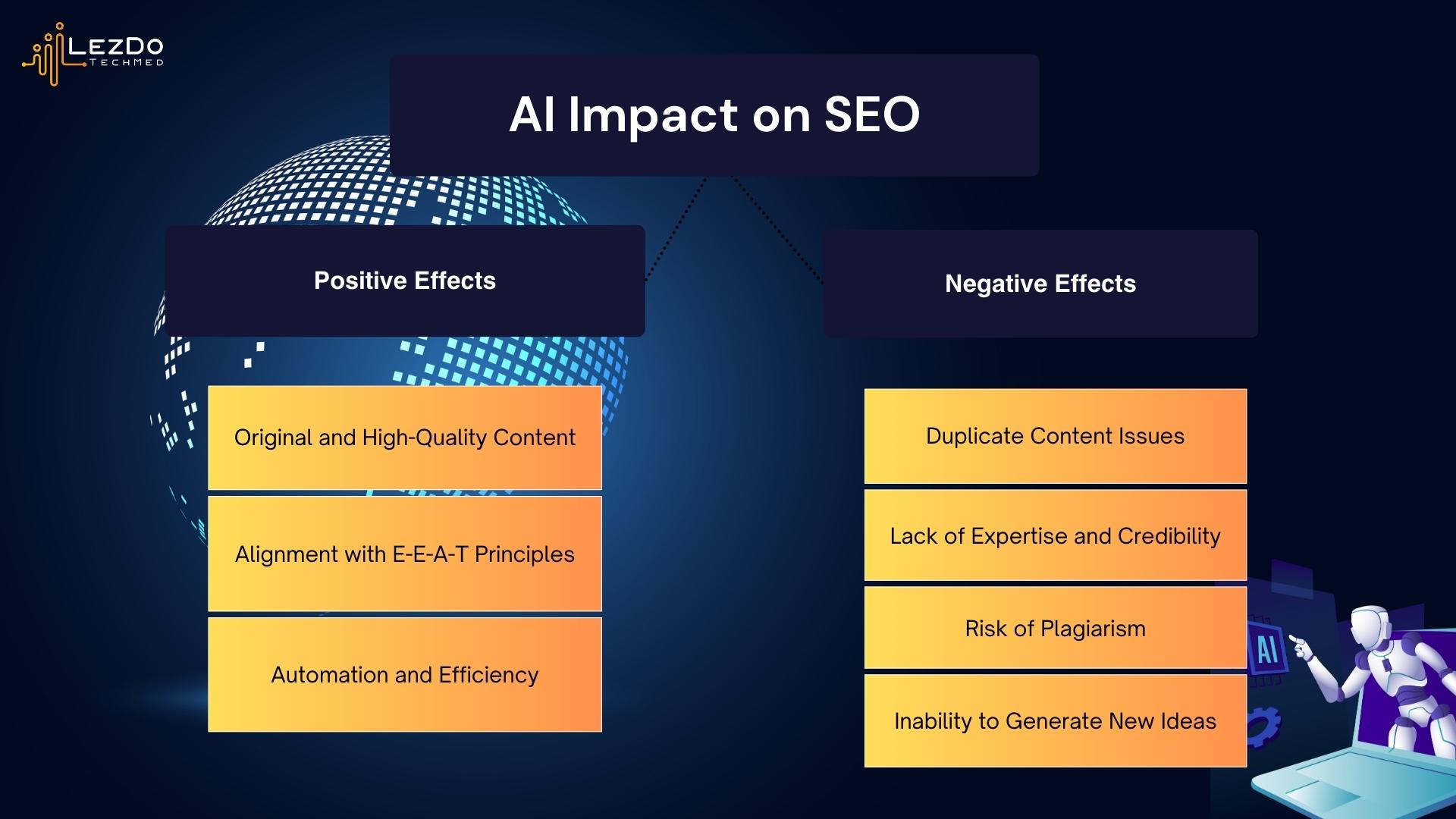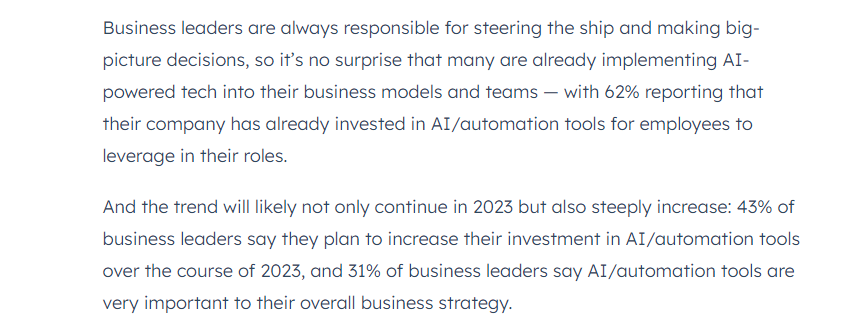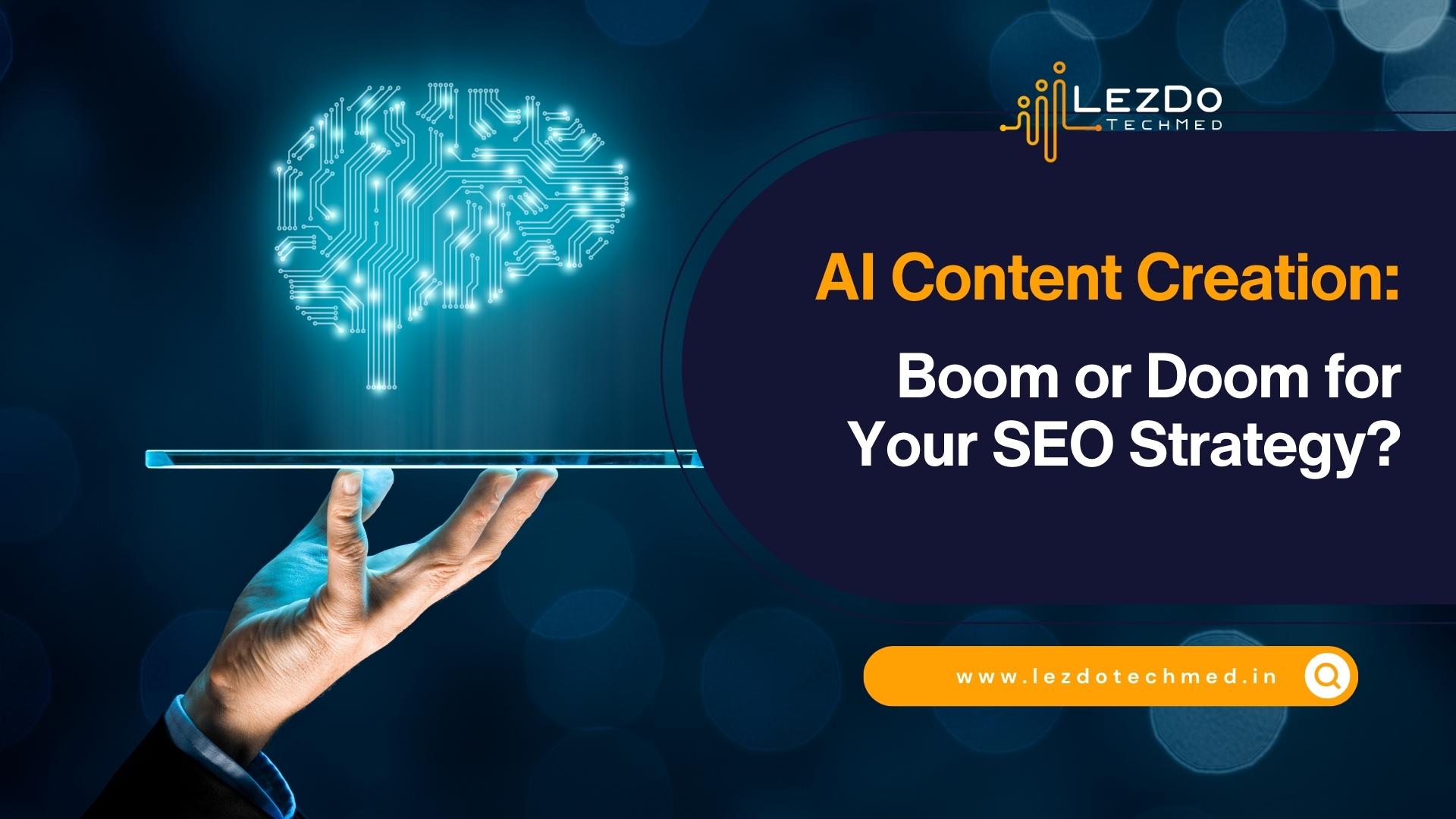Technology’s rapid advancement brings opportunities and challenges as we advance through the digital revolution. One such game-changer, leaving marketers either confused or fascinated, is the role of AI in content creation and its effects on SEO strategies.
Are we staring at an imminent doom that threatens the traditional pillars of content marketing, or are we on the brink of an unparalleled boom where AI could enhance our SEO strategies? Indeed, it’s quite the puzzle! But now is the time to analyze the complexity and understand how AI reshapes SEO.
So, let’s venture into this complex terrain with a simple goal – to determine whether the growing trend of AI content creation spells doom or boom for your SEO strategy.
What is AI-Generated Content?
AI-generated content refers to content created with minimal human intervention using sophisticated algorithms. These algorithms, part of the broader family of AI, are trained to produce human-like text based on the data they’ve been fed. But do AI tools merely involve hitting a ‘generate’ button and watching the content unfold? Not exactly.
These AI technologies, such as chatGPT and bard, utilize vast databases of human-created text to generate new, unique content. We must realize that the quality of AI-produced content relies heavily on the data it’s trained on. If the AI tool has been fed with well-written, engaging, and informative content, then it’s more likely to generate similarly high-quality content.
In 2023, the influence of AI content creation can be felt everywhere – from personalized email campaigns to interactive chatbots and even in generating news articles and blog posts. AI’s passion for creating content isn’t confined to just text. It branches into several other forms, such as images, videos, and audio.
AI algorithms can produce alluring visuals, compelling video narratives, and rich audio environments, redefining our understanding of creativity. Fascinating, right? Intrigued? You should be.
Is content important for SEO? Definitely. Content holds a pivotal role in every SEO strategy. Without compelling content, your site won’t secure a place in search engine rankings. Thus, it becomes imperative to craft top-notch, optimized content. By doing so, you elevate your website’s visibility and bolster its search rankings.
Does AI Content Affect SEO?
Investigating the influence of AI content creation on SEO leads us to an exciting crossroads. As many others do, you’re probably questioning how AI content creation fits into the framework of Google’s search rankings.
Google provides a clear response to this query. You see, Google’s focus has always been on rewarding high-quality, original content rather than its mode of production. Content demonstrating the E-E-A-T principles – Experience, Expertise, Authoritativeness, and trustworthiness—is more likely to rank higher in search results.
E-E-A-T means:
Experience
It refers to the personal encounters an author or content creator has with the topic at hand. Demonstrated through personal stories, or hands-on involvement, it contributes authenticity to the content.
Expertise
This refers to the depth of knowledge demonstrated in the content. Academic qualifications, industry experience, or other professional accomplishments often gauge it.
Authoritativeness
A measure of credibility, authoritativeness is the reputation a website or content creator commands in their field. It is reflected in using reliable sources, backlinks from reputed websites, or other forms of social validation.
Trustworthiness
This pillar of E-E-A-T encapsulates the trust that users can place in a website or content creator. It is often demonstrated through transparent language, avoidance of misleading information, and user-friendly practices that prioritize the audience’s best interests.
Are you wondering if AI-generated content can rank on Google?
The answer is, indeed, yes. However, it needs conditions. The AI content must be original, high quality, and pertinent to meet Google’s quality guidelines and comply with its E-E-A-T principles.
Companies considering utilizing AI content marketing should focus on original, high-quality content that resonates with their target audience. When considering AI for content creation, let’s shift our focus from mere technical feasibility to strategic and creative utility. In doing so, we can guarantee that our AI-generated content aligns with Google’s standards and effectively supports our business goals.
The future of SEO may be more digital than we have ever imagined, but its core remains very human.
View this post on Instagram
Risks of AI Content Creation for SEO
Exploring the connection of AI content for SEO and the evolving dynamics of digital marketing, we find ourselves at the forefront of a new era. As SEO and AI become increasingly intertwined, understanding the positive and negative implications is essential for businesses looking to remain competitive in the digital landscape. Here are some of the top reasons why AI-generated content might not be the best bet for your SEO efforts:
Duplicate Content Issues
When multiple users ask AI tools to generate content on identical topics, the AI may produce unique sentences for each user, but the central ideas may overlap significantly. This “conceptual duplication” can lead to content saturation, making your content less distinctive and potentially negatively impacting your SEO efforts.
Lack of Expertise and Credibility
Google advises publishers to prioritize user value by producing helpful content. It’s about demonstrating expertise, experience, authoritativeness, and trustworthiness, collectively referred to as E-E-A-T in Google’s search quality guidelines. AI, as ingenious as it is, lacks the human touch and the expertise that comes with it. This could compromise the credibility of your content, affecting your site’s E-E-A-T rating and, consequently, it’s SEO.
Inaccurate and Generic Content
As an AI tool generates content based on pre-existing data, it can occasionally produce inaccurate or generic content that lacks depth and nuance. This may not provide the rich, in-depth content that search engines favor and could negatively impact your SEO.
Devaluation by Google
While Google does not currently penalize AI-generated content, there is always the potential for future updates to the search algorithm that could devalue such content. Search engine algorithms continually evolve, and staying ahead of the curve is crucial.
Necessity for Human Oversight
AI content creation often requires a human touch to polish and perfect before publishing. The time and resources spent refining AI-generated content could be redirected toward crafting original, high-quality content.
Risk of Plagiarism
While AI does not intentionally plagiarize, the nature of its content generation – drawing from a vast pool of existing content – can sometimes result in similar content, which might be flagged as plagiarism by search engines.
Inability to Generate New Ideas
AI content creation tools are excellent at processing and rehashing existing data but fall short when it comes to generating new, innovative ideas. This lack of novelty might result in stagnant or repetitive content, which search engines might not favor.
Below, you can see the positive and negative effects of AI in SEO:

Expert Opinions on SEO and AI Content Creation
Expert opinions on AI and SEO content creation are diverse, with the consensus seeming that while AI tools have potential and are improving rapidly, they are still not ready to replace human involvement entirely.
- Nordic Morning
Some experts, like those featured on Nordic Morning, argue that the impact of AI on SEO and content creation is profound. Here’s where AI tools like ChatGPT for content creation have brought about considerable efficiencies, generating content on almost any given topic with surprising effectiveness.
They recognize the cost-effectiveness and ability of these tools to generate high volumes of content. But, they come with the caution that SEO-optimized content still requires substantial human touch.
AI tools lack the originality of human-created content because they operate based on predicting the next word or sentence based on an aggregate of information it’s been trained on.
The result? Inaccuracies or biases may emerge, and content may demand extensive human editing to fit brand guidelines, quality, and audience relevance.

- Sitechecker
Similarly, a study conducted by Sitechecker that polled 50 SEO specialists, including well-known figures in the field, found that 70% of SEO experts had positive experiences with AI-generated content but emphasized the importance of the human touch.
AI shines when generating blog posts, editing them, or summarizing them. However, the effectiveness of AI for e-commerce, social media websites, and forums is currently low, suggesting that AI tools are better suited for some tasks than others.
While AI tools are great for automating Meta descriptions, H1 tags, and other short-form copy, they are less reliable for generating long-form content, where human sense-checking and input are still necessary.

- HubSpot
HubSpot’s study, too, reveals the increase of AI influence on businesses. AI tools were noted to streamline processes, sifting through mountains of data and teasing out patterns. The study revealed that 62% of business leaders reported their companies have invested in AI/automation tools, with 43% intending to increase their investment in 2023.
Business leaders aren’t just reporting positive ROI from AI automation investments; they’re indicating them as a rich source of substantial value. Yet, like a refrain, the emphasis on human expertise echoes through, with businesses actively recruiting new talent specifically to harness the potential of AI/automation tools.

While AI content generation tools represent a significant advancement in modern technology, their drawbacks cannot be overlooked. As digital marketers, we must tread lightly, balancing the allure of AI capabilities with realizing its limitations.
It’s not about entirely discarding AI but finding a balance between AI and human expertise. Because, at last, we’re writing for real people, aren’t we?
Strategies to Combine Human Creativity with AI Capabilities
In a world where creativity and technology are rapidly merging, one must ask: How do businesses combine human imagination with the precision of AI to remain a step ahead?
Optimizing Marketing Strategies
Marketing professionals can design more targeted and effective campaigns by understanding customer demographics, interests, and behavior through AI. This can be especially beneficial for specialized services, where understanding client needs is crucial.
Enhancing Creativity with AI Tools
The creative process can be augmented with AI-powered tools that generate basic content drafts. This enables writers to focus on adding their creativity and personal touch. In the realm of design, AI can assist in creating visually appealing designs by suggesting website layouts, color combinations, and other creative elements, allowing designers to explore more creative possibilities.
Collaborative Creativity
The synergy between humans and AI can be cultivated by creating an environment where they work together, with humans focusing on big-picture ideas and AI handling more tedious tasks. Customized AI solutions can adapt to the unique creative processes of your team, providing support that enhances rather than hinders creativity.
Ethical Considerations
It’s crucial to approach the integration of AI in the creative process with ethical considerations in mind. Transparency in AI ensures all stakeholders are on the same page. Human oversight guarantees that content aligns with ethical standards and brand values.
The integration of human creativity with AI capabilities – is it about replacing the human touch? No. It’s about enhancing what we can achieve by leveraging human ingenuity and technological precision.
Conclusion
However, let’s not forget: the machines still need our human touch. Ensuring content quality, relevance, and authenticity remains a distinctly human responsibility. AI is viewed as a beneficial tool rather than a replacement for human expertise; the overreliance on technology can potentially impact a brand’s image and performance. While it has its current limitations, the influence of AI content and SEO is set to spread broader and deeper in the coming years.
